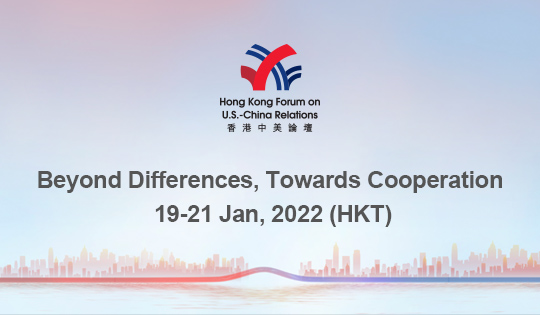Former Secretary of State Mike Pompeo's last-minute policies are potential landmines for the Biden administration.
By asserting that the Chinese government committed both 'genocide' and 'crimes against humanity' in its treatment of Uighurs in Xinjiang, the Trump administration intentionally accelerated Biden's commitment to transform Beijing's behavior with a coalition of allies through a humanitarian-focused public relations campaign. In short, Biden got the humanitarian angle his team suggested they would emphasize on, but allegations of genocide certainly went farther than Biden would have liked.
Pompeo also lifted 'self-imposed restrictions' on the relationship between the U.S. and Taiwan, further angering Beijing and creating chaos for the incoming U.S. administration. The U.S. values its economic ties with Taiwan, especially as semiconductors become more critical and the Taiwan Semiconductor Manufacturing Company (TSMC) remains dominant as a global chip producer. In the move to improve relations with Taiwan, Pompeo stated that the State Department had previously created "restrictions to regulate our diplomats, servicemembers, and other officials' interactions with their Taiwanese counterparts. The United States government took these actions unilaterally, in an attempt to appease the Communist regime in Beijing. No more."
Pompeo's deconstruction of diplomatic protocol disrupts Washington's longstanding position on the One China Policy and sets up the Biden administration for inevitable criticism. Should Biden reinforce Trump's decision to upgrade relations with Taiwan and emphasize human rights concerns in Xinjiang, some will argue that he failed to mend U.S.-China relations. If the new administration rejects Pompeo's moves, Republicans, and some Democrats, might call Biden weak on China. Although the Biden administration will likely continue advancing the relationship with Taipei, the island is now caught in the middle of a partisan disagreement where Republicans probably expect more pressure on Beijing than Democrats do – forcing Biden to reevaluate his next step forward cautiously.
Pomepo’s last-minute statements transformed Taiwan into the Biden administration's new geopolitical flashpoint. While China might have been responding to Taiwanese military drills that took place a week earlier, the Chinese Foreign Ministry did urge the U.S. to "refrain from sending the wrong signals to the Taiwan independent forces." It could be that Biden's failure to dismiss President Trump's policies on China sent a message that he would be just as 'tough on China.’
Biden Might Only Expand and Refine Trump’s China Policy
After his December 2016 presidential victory, Trump disrespected Beijing by taking Tsai-Ing Wen’s congratulatory phone call. The two leaders primarily discussed security and economic relations. In December 2017, Trump signed into law the National Defense Authorization Act for 2018, which urged Taiwan to participate in future military exercises. In August 2020, Health Secretary Alex Azar became the highest-ranking U.S. official to visit Taiwan since 1979. Then, Under Secretary of State Keith Krach visited the island a month later. The Taiwan Assurance Act of 2020, which was included in the U.S. government spending bill, called for normalizing regular arms sales between the U.S. and Taiwan to strengthen the island's self-defense capabilities. It also expressed U.S. support for Taiwan's participation in the United Nations, affiliated organizations such as the World Health Assembly and other international groups. Despite Beijing's repeated warnings, the Trump administration went further by approving $18.3 billion worth of arms sales to Taiwan, including 11 deals in the past three years. These figures surpassed the amount Barack Obama sold to Taiwan over eight years by $14 billion.
Should Biden provide the same degree of support to Taiwan and criticize Beijing over its human rights record, it will only prove that U.S.–Taiwan relations are defined by the structure and state of competition between the U.S. and China. It is not overly dependent who is sitting in the White House. Taiwan will remain critical to U.S. geopolitical strategy in the Indo-Pacific, which will inevitably intensify the China-U.S. rivalry. Nonetheless, the Trump administration's effort to undermine the 'One China Policy' is Washington's most extreme move after months of escalation.
In reality, Biden will likely focus on the coronavirus and the United States' economic situation before making any changes to his China policy. American negotiators will likely pressure China on limiting state involvement in its economy while relying less on tariffs than former President Trump. White House spokeswoman Jen Psaki recently said that "The President is committed to stopping China's economic abuses," but concrete moves will likely take some time.
After four years of 'pressuring' Beijing, Trump's prized trade deal is inconsequential, given that Beijing only bought about 55% of promised U.S. exports. However, under President Biden, the issues are much larger than trade. They include Taiwan and Xinjiang and territorial disputes, crackdowns on protests in Hong Kong, and privacy concerns around the globe due to Huawei 5G infrastructure. Katherine Tai, Biden's choice to become the next U.S. Trade Representative, said that the U.S. faces a China "whose economy is directed by central planners who are not subject to the pressures of political pluralism, democratic elections or popular opinion." Tai's words suggest that the Biden administration will attempt a 'transformational approach' instead of exclusively focusing on transactions and trade deficits like the trade relationship. Many believed that Biden might end up ‘too soft’ on Beijing, but it seems that Biden might retain Donald Trump’s China policy.
